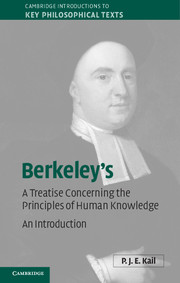Book contents
- Frontmatter
- Dedication
- Contents
- Acknowledgements
- Chapter 1 Introduction
- Chapter 2 Context and aims
- Chapter 3 The Introduction to the Principles
- Chapter 4 The argument for immaterialism
- Chapter 5 Against the philosophers: the refutation of materialism
- Chapter 6 Reality and God
- Chapter 7 Science and mathematics
- Chapter 8 Spirits
- Bibliography
- Index
- References
Chapter 5 - Against the philosophers: the refutation of materialism
Published online by Cambridge University Press: 05 June 2014
- Frontmatter
- Dedication
- Contents
- Acknowledgements
- Chapter 1 Introduction
- Chapter 2 Context and aims
- Chapter 3 The Introduction to the Principles
- Chapter 4 The argument for immaterialism
- Chapter 5 Against the philosophers: the refutation of materialism
- Chapter 6 Reality and God
- Chapter 7 Science and mathematics
- Chapter 8 Spirits
- Bibliography
- Index
- References
Summary
Introduction
The previous chapter discussed Berkeley’s case for immaterialism. The basis for this idea is a claim about the essence of sensible qualities. A sensible quality is essentially a form of appearance, and so it exists only in relation to a mind. The physical objects that populate the world are just collections of these sensible qualities and so physical objects are mind-dependent.
Much of the Principles attempts to show how this central insight is consistent with what we ordinarily believe of the world and how we are to understand the practice of science in its light. However, Berkeley’s first move, after offering his case for immaterialism, is to dispose of materialism. His objections to materialism are the subject of the present chapter. He has a battery of different objections to different characterisations of material substance, treating it, as Kenneth Winkler aptly puts it, as ‘a moving target’. This is not a surprise. As we saw in Chapter 2 there are differing views on material substance, and so Berkeley considers a different version of the doctrine and possible responses to his objections.
- Type
- Chapter
- Information
- Berkeley's A Treatise Concerning the Principles of Human KnowledgeAn Introduction, pp. 70 - 85Publisher: Cambridge University PressPrint publication year: 2014



